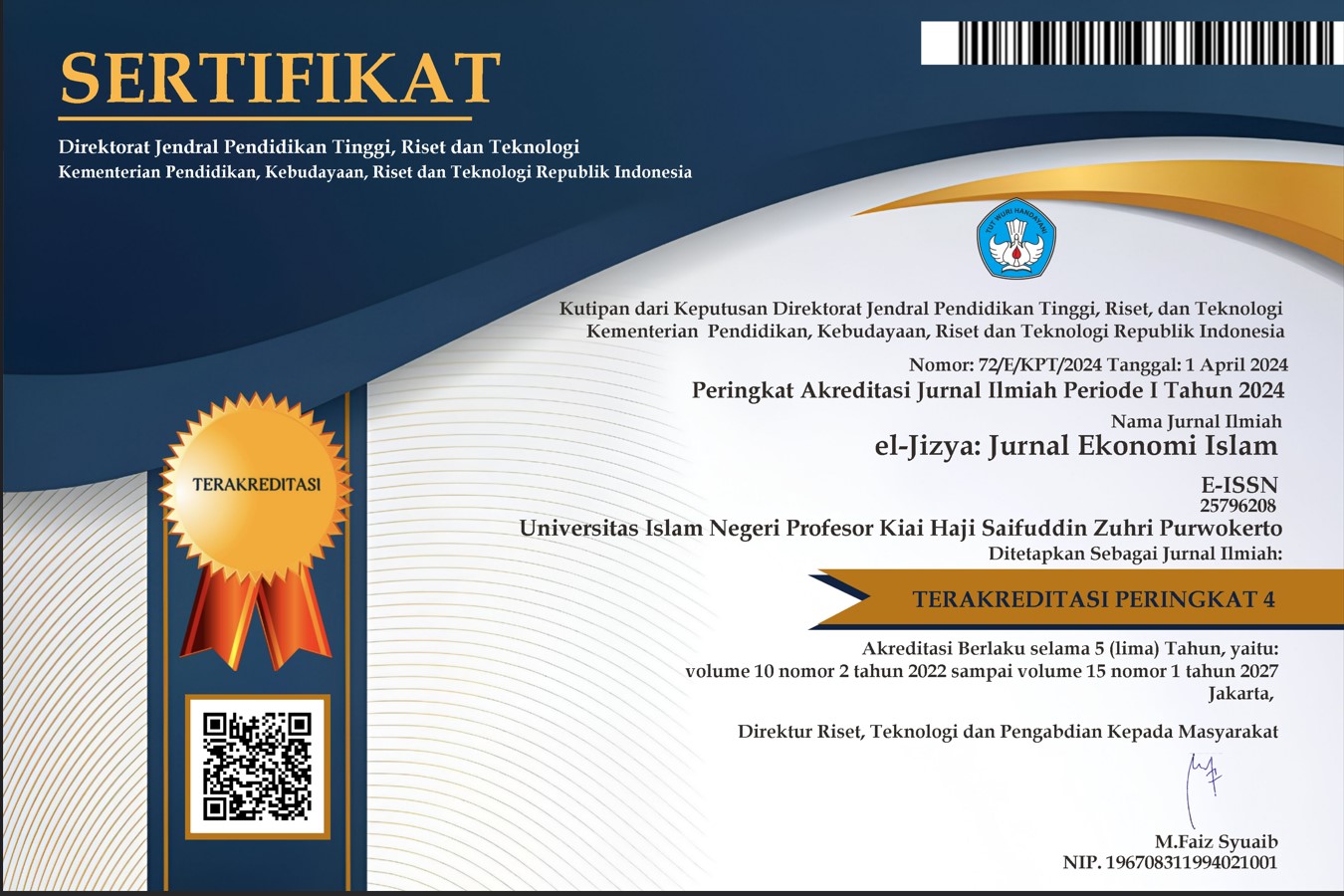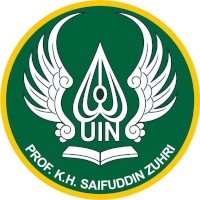Adopsi Standar AAOIFI pada BMT di Wilayah Eks Karsidenan Banyumas : Tinjauan Karakteristik Inovasi
DOI:
https://doi.org/10.24090/ej.v9i1.4805Keywords:
Relative Advantage, Compatability, Complexity, Trialability, observability, AAOOIFI Accounting standardAbstract
This study aims to determine the effect of relative advantage AAOIFI accounting standards, compatibility AAOIFI accounting standards, complexity AAOIFI accounting standards, trialability AAOIFI accounting standards and observability accounting standards AAOIFI partially to the adoption of AAOIFI accounting standards in the ex Karsidenan Banyumas. The population in this study is the accounting staff in the ex Karesidenan Banyumas. Sampling using purposive sampling method. The number of respondents in this study is 32 BMT accounting staff in the ex Karesidenan Banyumas. Hypothesis testing using multiple linear regression analysis method. The result of the test and analysis using multiple linear regression method shows that the relative advantage, compatability, complexity, trialability, and observability have a positive, significant effect towards the adoption of AAOIFI Accounting standard. Limitation of this study is (1) independent variables used in this study only pay attention to internal factors adopter that is characteristic of innovation just like relative advantage, compatability, complexity, ease to try and ease of observation.References
AAOIFI. 2010. Financial Accounting Standards, Accounting and Auditing Organization for Islamic Financial Institution, Manama.
Abdel-Magid, M. (1981), “The theory of Islamic banking: accounting implicationsâ€,
The International Journal of Accounting, Vol. 17 No. 1, pp. 79-102.
Antonio, M. S. 1999. Bank Syariah Sebagai Bankir dan Praktisi Keuangan. Bank Indonesia dan Tazkia Institute ; Jakarta.
. 2001. Bank Syariah dari Teori ke Praktik. Gema Insani Press dan Tazkia Cendikia ; Jakarta.
Atkinson, N. L. 2000. Developing a Questionnaire to Measure Perceived Attributes of eHealth Innovations. Department of Public and Community Health, University of Maryland, PP 612-621.
Baraba, A. 1999. Prinsip Dasar Operasional Perbankan Syariah. Buletin Ekonomi Moneter dan Perbankan, Vol. 2 No.3, hal. 5.
BMT Link. 2010. Tantangan BMT di Masa yang Akan Datang. Buletin Ekonomi dan Syariah, Vol. 9, hal. 5-13.
Ghozali, Imam. 2009. Aplikasi Analisis Multivariate dengan Program SPSS. Badan Penerbit Universitas Diponegoro. Semarang
Gujarati, Damondar. 2006. Ekoknometrika Dasar. Terjemahan Sumarno Zain, Jakarta: Erlangga.
Hameed, S. (2001), “Islamic accounting – accounting for the new millennium?â€, paper presented at Asia Paciï¬c Conference 1 – Accounting in the New Millennium, Reinassance Hotel Kota Bharu, Malaysia, 10-12 October.
Husein, Umar. 2013. Metodologi Penelitian Untuk Skripsi dan Tesis Bisnis. Gramedia Pustaka. Jakarta
Indriantoro, N dan B. Supono. 2009. Metodologi Penelitian Bisnis : Untuk Akuntansi dan Bisnis. BPFE. Yogyakarta.
Karim, R.A.A. dan Tomkins, C. 1987. The Shari’ah and Its Implication For Islamic Financial Analysis : An Opportunity to Study Interaction Among Society, Organization, and Accounting. The American Journal of Islamic Social Sciences, Vol. 4 No. 1, pp. 27-37.
Lovett, R. 2002. The Adoption Of International Accounting Standards : A diffusion of an Inovation. Thesis PhD. Nova Southeastern, Miami, FL.
OJK. 2013. Laporan Perkembangan Keuangan Syariah Tahun 2013.
Puskopsyah. 2012. Membumikan Lembaga Keuangan Syariah di Indonesia. Vol. 3. Hal. 12-19.
Roger, E.M. 2003. Diffusion of Innovationts, 3rd ed., The Free Press, Newyork, NY.
Sarea, A.M. 2012. The Level Compliance with AAOIFI Accounting Standards : Evidence From Bahrain. International Management Review, Vol. 8 No. 2.
Sarea, A.M dan M. Hanefah. 2013. Adoption of AAOIFI Accounting Standards by Islamic Banks Of Bahrain. Journal of Financial Reporting and Accounting, Vol. 11 Iss 2 pp. 131-142.
Shadia, R. 2007. Islamic Accounting Standards, pp. 1-9, diakses di : http://islamic-finance.net/islamic -accounting/acctg5.html (diakses pada 2 Februari 2020).
Abdel-Magid, M. (1981), “The theory of Islamic banking: accounting implicationsâ€,
The International Journal of Accounting, Vol. 17 No. 1, pp. 79-102.
Antonio, M. S. 1999. Bank Syariah Sebagai Bankir dan Praktisi Keuangan. Bank Indonesia dan Tazkia Institute ; Jakarta.
. 2001. Bank Syariah dari Teori ke Praktik. Gema Insani Press dan Tazkia Cendikia ; Jakarta.
Atkinson, N. L. 2000. Developing a Questionnaire to Measure Perceived Attributes of eHealth Innovations. Department of Public and Community Health, University of Maryland, PP 612-621.
Baraba, A. 1999. Prinsip Dasar Operasional Perbankan Syariah. Buletin Ekonomi Moneter dan Perbankan, Vol. 2 No.3, hal. 5.
BMT Link. 2010. Tantangan BMT di Masa yang Akan Datang. Buletin Ekonomi dan Syariah, Vol. 9, hal. 5-13.
Ghozali, Imam. 2009. Aplikasi Analisis Multivariate dengan Program SPSS. Badan Penerbit Universitas Diponegoro. Semarang
Gujarati, Damondar. 2006. Ekoknometrika Dasar. Terjemahan Sumarno Zain, Jakarta: Erlangga.
Hameed, S. (2001), “Islamic accounting – accounting for the new millennium?â€, paper presented at Asia Paciï¬c Conference 1 – Accounting in the New Millennium, Reinassance Hotel Kota Bharu, Malaysia, 10-12 October.
Husein, Umar. 2013. Metodologi Penelitian Untuk Skripsi dan Tesis Bisnis. Gramedia Pustaka. Jakarta
Indriantoro, N dan B. Supono. 2009. Metodologi Penelitian Bisnis : Untuk Akuntansi dan Bisnis. BPFE. Yogyakarta.
Karim, R.A.A. dan Tomkins, C. 1987. The Shari’ah and Its Implication For Islamic Financial Analysis : An Opportunity to Study Interaction Among Society, Organization, and Accounting. The American Journal of Islamic Social Sciences, Vol. 4 No. 1, pp. 27-37.
Lovett, R. 2002. The Adoption Of International Accounting Standards : A diffusion of an Inovation. Thesis PhD. Nova Southeastern, Miami, FL.
OJK. 2013. Laporan Perkembangan Keuangan Syariah Tahun 2013.
Puskopsyah. 2012. Membumikan Lembaga Keuangan Syariah di Indonesia. Vol. 3. Hal. 12-19.
Roger, E.M. 2003. Diffusion of Innovationts, 3rd ed., The Free Press, Newyork, NY.
Sarea, A.M. 2012. The Level Compliance with AAOIFI Accounting Standards : Evidence From Bahrain. International Management Review, Vol. 8 No. 2.
Sarea, A.M dan M. Hanefah. 2013. Adoption of AAOIFI Accounting Standards by Islamic Banks Of Bahrain. Journal of Financial Reporting and Accounting, Vol. 11 Iss 2 pp. 131-142.
Shadia, R. 2007. Islamic Accounting Standards, pp. 1-9, diakses di : http://islamic-finance.net/islamic -accounting/acctg5.html (diakses pada 2 Februari 2020).
Downloads
Published
01-06-2021
How to Cite
Utami, H. T. (2021). Adopsi Standar AAOIFI pada BMT di Wilayah Eks Karsidenan Banyumas : Tinjauan Karakteristik Inovasi. El-Jizya : Jurnal Ekonomi Islam, 9(1), 26–37. https://doi.org/10.24090/ej.v9i1.4805
Issue
Section
Articles
License
Authors who publish with this journal agree to the following terms:
- Authors retain copyright and grant the journal right of first publication with the work simultaneously licensed under a Creative Commons Attribution-ShareAlike License that allows others to share the work with an acknowledgement of the work's authorship and initial publication in this journal.
- Authors are able to enter into separate, additional contractual arrangements for the non-exclusive distribution of the journal's published version of the work (e.g., post it to an institutional repository or publish it in a book), with an acknowledgement of its initial publication in this journal.
- Authors are permitted and encouraged to post their work online (e.g., in institutional repositories or on their website) prior to and during the submission process, as it can lead to productive exchanges, as well as earlier and greater citation of published work (See The Effect of Open Access).















